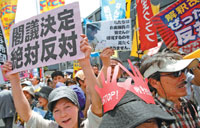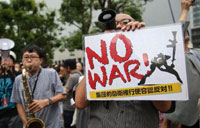 |
| Japanese cabinet lifts limits on self-defense |
 |
| Japanese protest against Abe on SDF |
The resolution, which is regarded as a major overhaul of Japan's postwar security policy, sets three new conditions that would enable the Japanese military forces to exercise the "collective self-defense right," such as when there are "clear dangers" to the lives of its people and their rights due to armed attacks on Japan or "countries with close ties."
In other words, it would enable Japan to fight for "countries with close ties" with Japan even though Japan itself is not under attack, leaving the war-renouncing Article 9 of the country's Constitution a dead letter.
Ironically, Japan committed heinous war crimes to Asian countries in the 1930s and 1940s and therefore has been banned to exercise the right to collective self-defense after World War II.
Japan's latest attempt to revise the war-renouncing Article 9 of the Constitution, widely taken as a radical turnabout from its post-war pacifist posture that has helped stabilize the security situation in Northeast Asia, has been initiated by increasingly assertive Prime Minister Shinzo Abe despite strong critisism at home and abroad.
As part of his effort to whitewash Japan's wartime military aggression, Abe's constitutional "reinterpretation" followed his brazen visits to the Yasukuni Shrine that honors 14 Class-A war criminals, and the challenge of the Kono Statement, which acknowledged and apologized for Japan's massive wartime sex slavery of Asian women.
"I WILL NEVER SEND MY CHILDREN TO KILL OR BE KILLED"
Many are arguing that Abe has used his party's majority power in both chambers of parliament to craft, steamroll and enact this plan, in a manner that has not allowed for adequate debate in the Diet and has skirted the government's responsibility to seek public approval for such a monumental shift in security policy.
The public's voice has been marginalized to street protests. On Monday, about 10,000 protestors rallied in front of Abe's official residence, shouting loud "Tokyo against Fascism, now or never!" and "Step down Abe!" with megaphones and drums.
"I will never send my children to a battlefield to kill or be killed in a war, even the Americans urged us to," a 70 year-old woman with the family name of Murayama said to Xinhua.
28-year-old Hiroko Okada also came to the protest with her three-year-old son.
"Adults have a responsibility to make the right decision so children will not suffer in the future," she told Xinhua, adding "it's absolutely wrong to decide something so important only through a cabinet decision."
The protest, one of so many in recent days, was held only one day after a mid-aged man immolated himself on a girder of a pedestrian bridge in downtown Tokyo -- a rare form of protest in Japan -- after speaking out against Abe's re-interpretation of Article 9.
The tragedy seemingly did not touch politicians in Nagatacho, center of Japanese politics. Prevalent dumbness of Japanese mainstream media, such as the NHK, is also shocking.
Opposition to Japan exercising the right to collective self-defense is growing. According to the latest poll conducted by Japan's Nikkei News from June 27 to June 29, over half of Japanese oppose exercising the collective self-defense, 54 percent against reinterpretation of the constitution, with 29 percent supporting the move.
An earlier poll by Japan's Mainichi Shimbun showed that Abe's support rate has fallen to 45 percent, the lowest since his term from December 2012.
"US will, others' calamity"
Abe's revised security policy has aroused criticism in many Asian countries, which had suffered from Japanese wartime aggression during WWII.
China on Tuesday urged Japan to respect Asian neighbors' security concerns and not to harm China's sovereignty and security interests.
